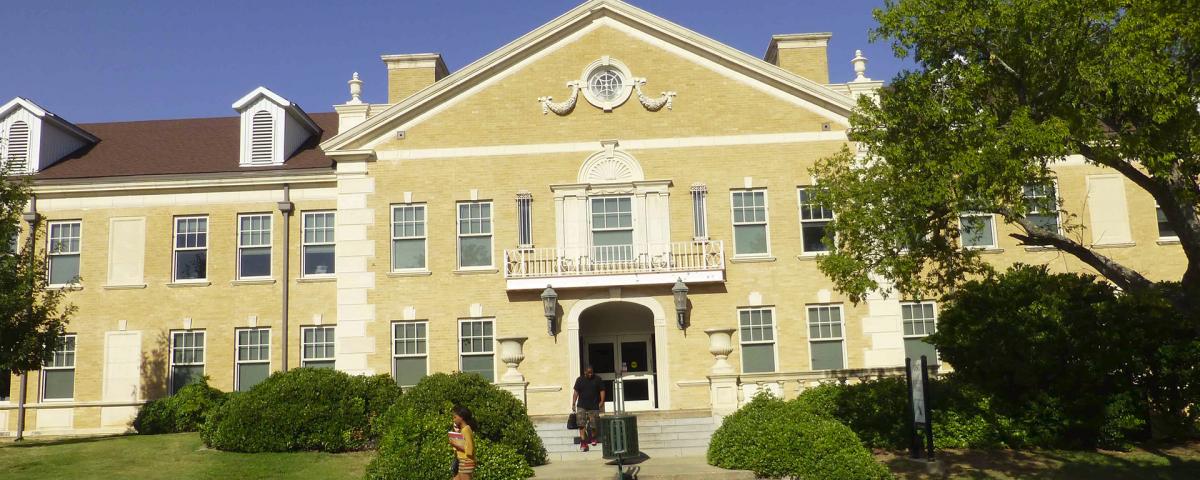Become a health sciences educator, researcher or leader
Pursuing a doctoral degree in Health Sciences at the University of North Texas gives you a broad foundation in public health concerns, research and evaluation methods, and social policy analysis to meet the demands of a dynamic health services delivery environment.
Our faculty has a vast array of experience in a variety of health care delivery environments, and broad expertise in health care and health-related research and policy. The focus is on developing academic research scientists who are interested in contributing to the health services discipline through research, education and policy analysis.
Fall 2025 priority application deadline is December 1, 2024. Applications that are submitted by the priority deadline will receive priority by the admissions team. Fall 2025 regular application deadline is January 31, 2025.
The UNT graduate application is a concurrent two-part process. All graduate applicants must apply to the Toulouse Graduate School as well as to the department where the graduate program is located. The application process is described below:
Step One
Apply to UNT
First, apply to the Toulouse Graduate School through the online Apply Texas application and pay the application fee.
Request Transcripts
Obtain your official transcripts from each college or university you attended. Transcripts must be sent directly to the graduate school. Official transcripts can either be sent electronically to gradadmission@unt.edu or mailed to:
Toulouse Graduate School
1155 Union Circle #305459
Denton, TX 76203-5017
International Students
All international applicants to UNT must show proof of English language proficiency. More information is provided here
Step Two
Apply to the Health Science Ph.D. program
Admission to the PhD program is a holistic process that includes a broad assessment of the applicant's background and potential for success. You will therefore need to provide the following information:
Complete the program application
Submit the following:
Statement of Intent that includes:
-
- Rationale for choosing the Health Science Ph.D. program
- Your short and long-term career goals
- Your qualifications and readiness for doctoral study, including research experiences and interests
- Discuss a specific area in Health Sciences on which you would like to focus during your doctoral studies
Current resume
Sample of previous scholarly work (may include prior research papers, published articles, written work that demonstrates research abilities)
Submit three letters of recommendation
Letters should be from former professors and related professional supervisors that speak to your academic capability to be successful in a doctoral program. Must be submitted on appropriate letterhead with an original signature.
Letters should be e-mailed by recommenders to: hlsr-applications@unt.edu
Step Three
Interview
Completed applications received by the December 1 deadline are reviewed by an Admissions Committee and applicants may be asked to participate in an interview with faculty members as final step in the application process. Interviews are typically conducted in February, with offers of acceptance distributed by mid-February.
Fall 2025 priority application deadline is December 1, 2024. Applications that are submitted by the priority deadline will receive priority by the admissions team. Fall 2025 regular application deadline is January 31, 2025.
Proceed to Program Application
If you have any questions, please contact us at rhs@unt.edu
The minimum program for the Health Sciences Ph.D. requires 51 hours beyond the master's degree.
Specific requirements include:
- 18 semester hours in foundation core courses covering health disparities across populations and various research designs and statistical analyses relevant in the field of health sciences
- 15 designated semester hours in the student's chosen concentration
- 9 semester hours of approved electives
- A minimum of 9 semester hours of dissertation
Prospective students should be aware that the Health Sciences Ph.D. is a traditional on-campus program with most classes scheduled during regular business hours. If you have any questions, please email rhs@unt.edu.
Applied Aging and Rehabilitation Science
This concentration area is designed for the health science practitioner who is interested in making contributions to the discipline through research, while maintaining their focus on active engagement with vulnerable populations, such as older individuals and those with chronic illness or disability. In the current health care environment, the emphasis is on increasing quality, decreasing the cost of service delivery and on achieving positive, measurable outcomes that improve the health of vulnerable populations and that make services accessible and affordable. The program relies on a science-practitioner model to develop researchers, educators and leaders who will make a positive impact on the health care environment.
AARS 6800 - Social Policies for Health and Aging
AARS 6810 - Global Perspectives on Aging and Disability
AARS 6820 - Community Integration and Participation
AARS 6830 - Disability, Health and Functioning
AARS 6840 - Organizations for Aging and Health Services
Audiology and Speech-Language Pathology
The mission of the Ph.D. with a major in health sciences research and a concentration in audiology and speech-language pathology (ASLP) is to prepare researchers, educators and leaders in the academic fields of audiology and speech-language pathology with an emphasis on interdisciplinary collaboration. This program focuses on developing competent researchers, educators and leaders to be at the forefront of knowledge for improving the overall quality of life of persons with speech, language and hearing disabilities. Graduates are expected to demonstrate advanced knowledge and technical expertise in addressing critical areas of research, education, service delivery, clinical practice and professional policy. Courses in the concentration include:
ASLP 6991 - Instrumentation in Speech and Hearing Sciences
ASLP 6992 - Advanced Neuroanatomy and Neurophysiology of Communication, Audition and Vestibular Functions
ASLP 6993 - Advanced Topics in Audiology, Speech and Language
ASLP 6994 - Auditory and Language Processing in the Brain
ASLP 6995 - Communication and Communication Disorders Across the Life-Span
Behavior Analysis
The mission of the Ph.D. with a major in health sciences research with a concentration in behavior analysis is to train the next generation of behavioral scientists and scientist-practitioners to work across disciplinary boundaries to expand scientific understanding and capability and to solve socially relevant problems. Within the behavior analysis concentration, students can focus on a variety of research and application areas such as populations with learning differences (Autism and Developmental Disorders), social justice, teaching sciences, animal behavior, behavioral neuroscience, and behavioral health and contingency management. The program relies on a junior-colleague model to develop world-class researchers, educators, and leaders inside and outside the academy. Courses in the concentration include:
BEHV 6010 - Survey of Literature in the Experimental Analysis of Behavior
BEHV 6020 - The Conceptual Basis of Radical Behaviorism
BEHV 6140 - Advanced Strategies and Tactics in Behavior Analytic Research
BEHV 6200 - Behavior Analysis from a Systems Perspective
BEHV 6410 - The Dissemination and Application of Behavior Analysis

Scholarships & more
The Department of Rehabilitation and Health Services in the College of Health and Public Service offers thousands in scholarships to students each year, including:
- Cora A. Martin Scholarship
- Rapoport/Friedsam Scholarship
- Harry R. Kendall Scholarship
Program DirectorGraduate students are advised by department faculty. Program Director Denise Catalano can help connect you with potential faculty advisors based on your unique interests. Rachita Sharma, Ph.D., LPC-S, CRC Chair of Rehabilitation & Health Services Rachita.Sharma@unt.edu field_phone_number] Chilton 218K |
 |


